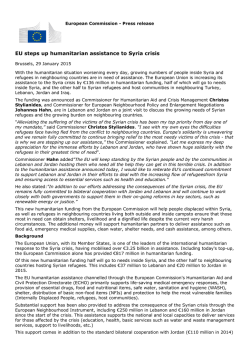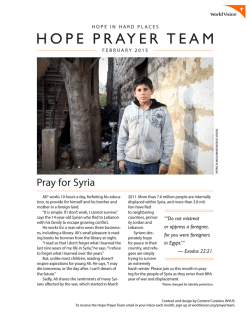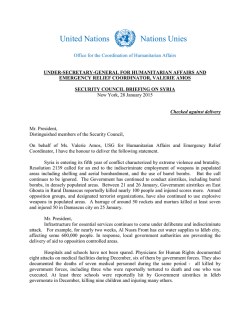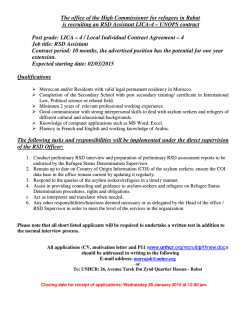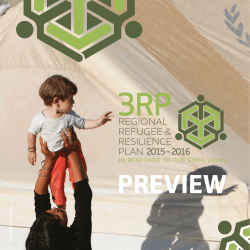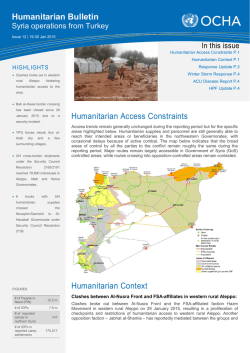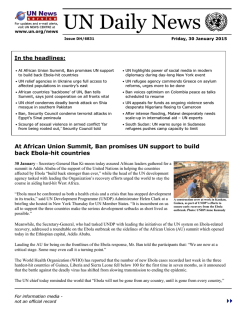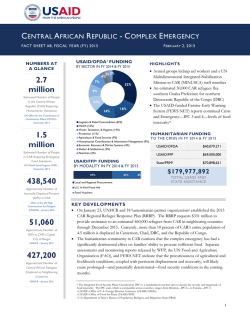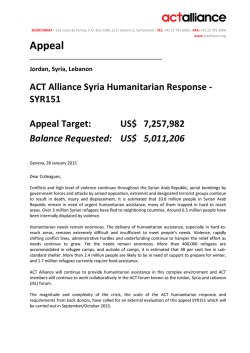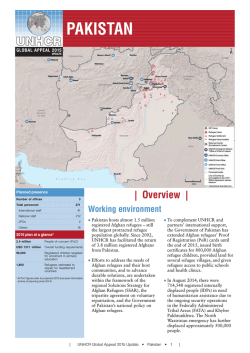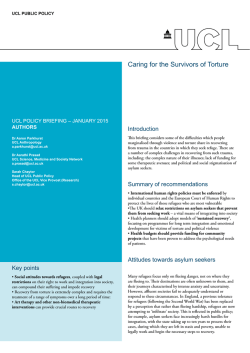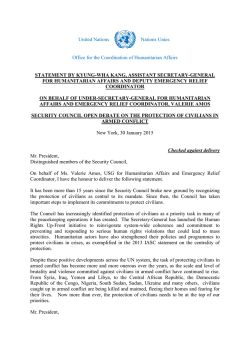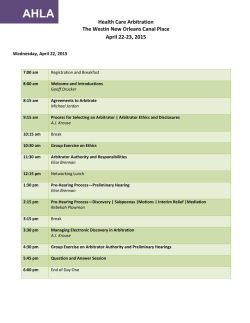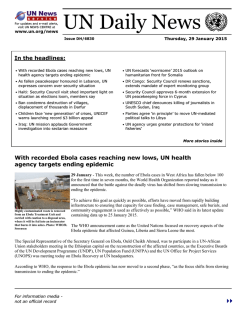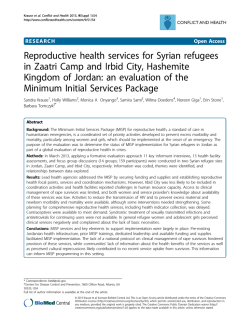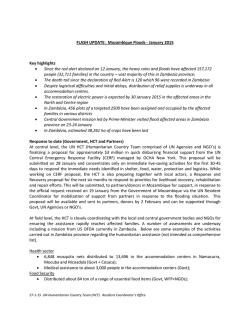
Jordan: Syria Crisis - European Commission
Jordan: Syria Crisis ECHO FACTSHEET Facts & Figures (as of 28 January 2015) shortage Number of people of concern in Jordan: Over 620 000 Syrian refugees 2 million Palestinian refugees Over 43 688 Iraqi refugees European Commission funding for Jordan since the start of the crisis: More than €3015million for Syrian refugees / and host communities, including €160 million in humanitarian assistance Humanitarian Aid and Civil Protection Photo credit: Mais Salman Key messages The Syrian crisis continues to deteriorate, with humanitarian needs and the number of refugees further on the rise. The European Union commends the Government of Jordan for its sustained and generous support to the more than 620,000 Syrian refugees who together with more than 2 million other refugees account for almost one third of the population of Jordan. The EU will continue to support the Jordanian Government and humanitarian actors on the ground in supporting vulnerable Syrian refugees in particular those living outside of camps, as well as Jordanian host communities. Since the beginning of the crisis the European Commission alone has allocated more than €315 million in assistance to refugees and vulnerable communities in Jordan, including more than €160 million from the humanitarian budget. The issue of decreasing refugee protection is of increasing concern in Syria and neighbouring countries, including Jordan. The EU calls upon the Government of Jordan for ensuring sufficient protection of refugees in the country in line with humanitarian principles. B-1049 Brussels, Belgium Tel.: (+32 2) 295 44 00 Fax: (+32 2) 295 45 72 email: [email protected] Website: http://ec.europa.eu/echo * All the latest ECHO Factsheets: bit.ly/echo-fs ECHO Factsheet – Jordan: Syria Crisis – 2015 Humanitarian situation and needs Major needs and related problems As the civil war in Syria continues unabated, Jordan must be commended for its substantial and generous hospitality. As of January 2015, there are over 620 000 Syrian refugees in Jordan, with children comprising over 50 per cent of this population. Most of the refugees (about 80%) are living in host communities, while the remaining live in 3 refugee camps. The conflict in Syria and Iraq is having an important impact on the country's socioeconomic conditions. The country's community resources, infrastructure and social services have been seriously overstretched and rising rents and competition for jobs have contributed to raising tensions between refugees and host populations. Security concerns due to the instability in the region have caused restrictions on the borders for persons fleeing conflict and persecution in Syria. Syrian refugees living in the country are as well facing restrictions in accessing health and education services. An increasing number of refugees are forced to return to camps and back to Syria. Between September and the beginning of December, asylum seekers stranded in the border between Syria and Jordan reached some 5 000 persons and they were left to wait for weeks in difficult conditions. At the end Jordanian authorities allowed the transfer of about 1 130 Syrians to transit centres. Most likely, the remaining bulk of asylum seekers in the no-man's land had to return to their place of origin or to further internally displace. There are reports of evictions of informal tented settlements (ITSs) by the Jordanian authorities. Three ITSs have been dismantled in early December displacing 41 families/205 individuals. The region is in the midst of a harsh winter, which is having terrible consequences on the refugee population, many of whom are living in inadequate shelters. The European Commission is supporting winterization assistance, which includes cash, clothes, gas bottles, shelter improvements and other in-kind support. The European Union's Humanitarian Response Funding Since the beginning of the crisis, the European Commission has channelled some €300 million to Jordan through humanitarian, development and financial assistance. The European Commission's Humanitarian Aid & Civil Protection department (ECHO) has contributed around more than €160 million for the provision of services such as health, food assistance, basic household items, shelter, water and sanitation, psychosocial support and protection to refugees both in camps and living in urban settings. This figure includes the recent top-up of €20 million announced by the European Commissioner for Humanitarian Aid and Crisis Response, Christos Stylianides, during his mission to Jordan on 29 January 2015. The provision of basic services in villages and towns across the country also includes vulnerable Jordanian families. In early 2015, a heavy winter storm affected refugees' tents in both Zaatari and Azraq camps. ECHO, together with UN and NGO agencies, launched an emergency cash programme to assist 41,000 vulnerable Syrian refugee children under the age of 14. Repairs of damaged shelter units in Zaatari and Azraq camps as well as distribution of additional winter clothing and household items were carried out. UNHCR has also provided an additional emergency cash allowance to 29 270 vulnerable Syrian refugee families living in local communities to cover essential needs such as heating costs. *All the latest ECHO Factsheets: bit.ly/echo-fs ECHO Factsheet – Title - 2014 - Page 2 /2
© Copyright 2026
